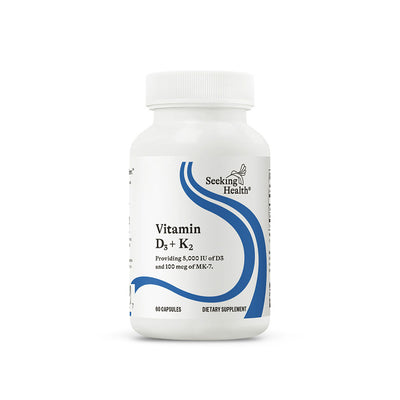TL;DR The MTHFR gene produces an enzyme that helps create methylfolate, a critical form of folate for overall health. This gene plays a key role in cell function, growth, and energy production. Proper nutrition, especially B vitamins and antioxidants, helps support MTHFR activity, while factors like stress, medications, and nutrient deficiencies can disrupt its function.
What Is the MTHFR Gene?
MTHFR stands for methylenetetrahydrofolate reductase. While that's a mouthful, it plays a crucial role in your health. You might wonder, "What does the MTHFR gene do for me?" In short, it produces the MTHFR enzyme, which generates methylfolate—the primary form of folate in your body. This little enzyme has a big job, as methylfolate is vital for overall health.1
What Is the One Job Your MTHFR Gene Has To Do?

Your MTHFR gene has one vital role: keeping the proper methylfolate levels in your blood. But where does it work its magic? The answer is everywhere—your entire body relies on this regulation.2
Inside every single cell of your body, genes like MTHFR are coiled up in the nucleus, doing their job. This gene doesn’t function uniformly—some parts of your body need barely any support, while others demand a lot. It’s this balance that keeps you feeling your best!
Where Does MTHFR Function the Most?
The MTHFR gene plays a crucial role in many parts of the body, including:
- Lymph
- Blood Cells
- Stomach
- Esophagus
- Lungs
- Spleen
- Testis
- Ovaries
- Prostate
- Uterus
- Liver
- Pancreas
- Cervix
- Salivary Glands
- Tonsils
- Retinas
In a developing baby, MTHFR functions the most in the:
- Heart
- Brain
- Liver
- Ovaries
When considering its function, understanding why the MTHFR gene is essential for life becomes more apparent. Methylfolate is vital for these organs to function correctly. Without methylfolate, essential processes like cell maintenance and growth would stop, highlighting the gene's indispensable role in your overall health.

What Influences the MTHFR Gene?

Several factors can influence how the MTHFR gene works, resulting in either a “clean” MTHFR that functions properly or a “dirty” MTHFR that can cause various health issues.
Factors Supporting a Clean MTHFR
To maintain a clean MTHFR, you can focus on supporting it with the following:†
- Vitamin B2 (Riboflavin)
- Vitamin B6 (Pyridoxine)
- Vitamin B12 (Methylcobalamin)3
- Folinic Acid (another active form of folate)
- Eating liver and leafy green vegetables
- Antioxidants, especially glutathione4
- Healthy thyroid hormone levels5
Factors Contributing to a Dirty MTHFR
Several factors can slow down the function of the MTHFR gene, leading to a dirty MTHFR:
- Vitamin B2 deficiency
- Vitamin B6 deficiency
- Vitamin B12 deficiency
- Folic acid6
- High protein intake7
- High oxidative stress8
- Hypothyroid (especially low T4)9
- Laughing gas (nitrous oxide)10
- Medications like Phenytoin11 and Carbamazepine12
- Methotrexate13 and 5-FU14
- SAMe supplementation15
- Air pollution (fine particulate matter)16
Understanding the Role of MTHFR, Simplified!
To understand MTHFR better, think of it like a key to your car. The key fits into the ignition and unlocks the car’s ability to start. However, it doesn’t actually start the car—the gas, battery, alternator, belts, radiator, and computers all work together to start the car once the key is in the ignition and turned.
In the same way, the MTHFR gene works with riboflavin and other upstream folates to produce methylfolate. That’s its primary job.

You might have also heard that your MTHFR gene is linked to various aspects of health, such as:
- Gut health
- Dopamine production
- Immune system function
- Glutathione levels
- Methylation processes
- Energy levels
These associations are all indirectly related to the MTHFR gene's primary function. However, don’t get sidetracked by all these indirect associations. Focus on the understanding that the MTHFR gene is fundamentally about producing methylfolate with the help of riboflavin and folates.
Seeking Health® Methylation Supplements
Prioritize healthy methylation and clean MTHFR with methylation supplements from Seeking Health®. When you prioritize this vital process, you’re supporting the building blocks of life and overall health and well-being.
- Methyl B12 with L-Methylfolate provides a potent dose of bioavailable folate and vitamin B12 in a delicious, well-absorbed lozenge. It supports healthy methylation, homocysteine regulation, and energy production with methylfolate and active B12.†
- Homocysteine Nutrients is a best-seller that provides the five nutrients your body requires for optimal methylation. This unique formula supports the body’s normal homocysteine breakdown for heart health support.†
- Active B12 5000 (Soon Methyl B12 5000) provides a potent dose of bioavailable vitamin B12 in a delicious, well-absorbed lozenge. Each serving contains a 5,000 mcg mixture of methylcobalamin and adenosylcobalamin.†
- Liposomal Glutathione is a powerful antioxidant support formula. Each serving provides 100 mg of reduced glutathione packaged in soy-free liposomes to enhance absorption and delivery.†
The Bottom Line

The MTHFR gene plays a vital role in your body's health by producing methylfolate, a key folate essential for cellular function and overall well-being. Supporting this gene with proper nutrition, like B vitamins and antioxidants, helps maintain clean MTHFR activity, which is essential for methylation and homocysteine regulation.†
Factors like oxidative stress, certain medications, and nutrient deficiencies can disrupt MTHFR function, leading to potential health issues. Prioritizing healthy methylation through targeted supplements, such as those offered by Seeking Health®, can ensure your body has the tools it needs to thrive.†
References:
- https://www.ncbi.nlm.nih.gov/books/NBK6561/
- https://pubmed.ncbi.nlm.nih.gov/34960114/
- https://pubmed.ncbi.nlm.nih.gov/19624857/
- https://pubmed.ncbi.nlm.nih.gov/31066758/
- https://pubmed.ncbi.nlm.nih.gov/32887268/
- https://pubmed.ncbi.nlm.nih.gov/27515258/
- https://pubmed.ncbi.nlm.nih.gov/38203363/
- https://pubmed.ncbi.nlm.nih.gov/35758831/
- https://pubmed.ncbi.nlm.nih.gov/23856660/
- https://pubmed.ncbi.nlm.nih.gov/26142939/
- https://pubmed.ncbi.nlm.nih.gov/30442198/
- https://pubmed.ncbi.nlm.nih.gov/15361376/
- https://pubmed.ncbi.nlm.nih.gov/35912215/
- https://pubmed.ncbi.nlm.nih.gov/32934008/
- https://pubmed.ncbi.nlm.nih.gov/30081597/
†These statements have not been evaluated by the Food and Drug Administration (FDA). This product is not intended to diagnose, treat, cure, or prevent any disease.












